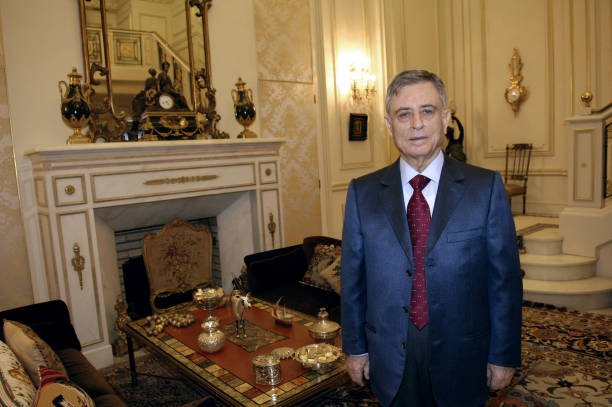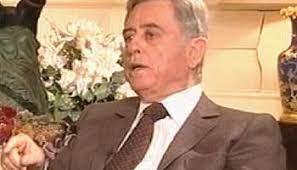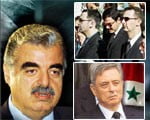He does not have an alliance with Hikmat Shihabi and has nothing to do with Rifat Al-Assad. He held the Syrian regime responsible for the deterioration of the relationship with Paris.
Former Syrian Vice President Abdel Halim Khaddam, currently residing in Paris, has announced his intention to establish a national alliance in Syria aimed at overthrowing President Bashar Al-Assad and holding accountable those security personnel who have been involved in negative actions against Syrian citizens. He clarified that he does not have an alliance with former Chief of Staff Hikmat Shihabi, who resides in America. In an interview with United Press on Saturday, Khaddam stated, “I am not forming an alliance with Hikmat Al-Shihabi, but I am working towards establishing a national alliance in Syria. My goals are not personal, and I have no personal ambitions. My aim is to overthrow Bashar Al-Assad and bring to justice the security personnel who have acted against the interests of Syrian citizens. I have nothing to hide or fear.”
Khaddam made it clear that he has no connection, whether close or distant, with any Syrian officials living outside of Syria, including former Syrian Vice President Rifaat Al-Assad, who resides in France. He stated, “I have no intention of meeting with Zaid or Omar.” When asked about the vision for a new regime in Syria after his departure from the Arab Socialist Ba’ath Party, Khaddam responded, “In the 1950s, Syria was a democratic country. Democratic Syria led to the cessation of the Baghdad Alliance. Democratic Syria used to send its staff to most Arab countries.” He emphasized that the desired system for Syria is a democratic one, which entails the release of public freedoms and the abolition of the state of emergency. This, in turn, would unleash the potential of the Syrian people, enabling Syria to fulfill its role in the Arab arena.
Khaddam expressed his support for the Damascus Declaration, issued on October 16th by 12 political parties and several Syrian opposition figures, calling for a comprehensive democratic change in Syria. He emphasized that the establishment of a democratic national system is the primary approach for the project of change and political reform. Khaddam stated, “I fully endorse this declaration. Its content aligns perfectly with my own views.” He declined to answer whether he was in contact with the individuals who signed the Damascus Declaration and emphasized the importance of enacting a new law for political parties in Syria, without any restrictions on any group wishing to form a party.
After praising French President Jacques Chirac and commending his policy towards Syria and Lebanon as correct, Khaddam attributed the deterioration of relations between Paris and Damascus to Assad and his associates. He categorically denied any contact with American officials, whether initiated by him or by them. Khaddam declined to provide details about the statement he had given to the International Commission of Inquiry into the assassination of former Lebanese Prime Minister Rafik Hariri on Friday. Hariri was killed in a bombing that targeted his convoy in Beirut on February 14th.
Khaddam accused Assad of mistreating Hariri, which resulted in nosebleeds, and believed that Assad’s incitement led to Hariri’s assassination. When asked about the possibility of normalizing tense relations between Lebanon and Syria, Khaddam stated that it would not be possible to convince a group of Lebanese to do so until the investigation into Hariri’s assassination is concluded. Many Lebanese hold the Assad regime responsible for the assassination. Syria denies the involvement of any of its citizens in Hariri’s killing. Khaddam, who was responsible for the Lebanese file from the outbreak of the civil war in 1975 until Bashar Al-Assad assumed the presidency of Syria in the summer of 2000, warned against undermining the Taif Agreement, which ensured equal power-sharing between Christians and Muslims in Lebanon. He believed that doing so would bring Lebanon back to square one, potentially leading to a new civil war.
Regarding his stay in France, Khaddam stated that he had not contacted any French officials nor sought political asylum. He emphasized that there is no protocol preventing foreign politicians from speaking in France since freedom of expression is upheld in the country. Some French diplomats expressed their discomfort with Khaddam’s recent press statements about his defection from the Syrian regime and his accusations of corruption and incitement against the Damascus leadership. French Foreign Ministry spokesman Jean-Baptiste Mattey clarified on Friday that they had no contact with Mr. Khaddam and his statements did not reflect their position. Responding to a question about Chirac’s remarks, Khaddam emphasized that Chirac had no involvement in using his statements to overthrow the Syrian regime. Khaddam affirmed the veracity of his own words, stating that he had not claimed to be working towards overthrowing the regime in Syria. He believed that the reason for the deteriorating relations between Damascus and Paris lay in Assad’s misguided interpretation and decisions. Khaddam also expressed that France is a friendly country to Syria, Lebanon, and the Arab world and should be approached on that basis.



